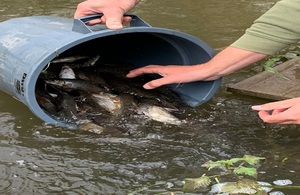A Lodda, Lodda fish!
Rivers feeding the River Loddon restocked for healthy habitats.

Bar-bulous! Thousands of barbel and other fish have been released into rivers in Berkshire and Hampshire, all bred at the Environment Agency's fish farm in Nottinghamshire
Money from fishing licences is sprucing up rivers in Berkshire and north Hampshire.
More than 2,000 fish have been introduced into waters around Reading and Basingstoke as the Environment Agency prepares for the spring spawning season. Improvements have also been made to help the fish acclimatise to their new home.
Twyford and District Angling Club was given £9,500 from the Fisheries Improvement Programme to install a riverbed carpet of gravel in St Patrick’s Stream to aide spawning. The money will also pay to secure trees or other natural materials in the water to give fish shelter in the fast-flowing rivers.
Fisheries officers from the Environment Agency released 300 barbel at the same spot, along with similar numbers of chub, dace and roach. The stream is a tributary of the River Loddon, forming a route from Wargrave to Twyford, Charvil and Sonning and ultimately into the Thames.
The barbel were marked with a blue dot to help officers and anglers monitor their development.
Adrian Bicknell, the Environment Agency fisheries officer leading the rehoming, said:
The fish quickly got used to the flow of the stream. They swam off strongly when we transferred them into the water. Rivers full of healthy fish mean more vibrant surroundings for them, other water life and the anglers who use them.
We’re keen that anglers take photos of fish they capture, recording the weight and length along with the location of any of the marked barbel.
We’ll now work with angling clubs and volunteers from the Loddon Fisheries and Conservation Consultative interest group to track reports about the fish we’ve introduced at the 3 spots.

Environment Agency fisheries officer Adrian Bicknell, left, looks suitably pleased as more fish are introduced into a stream outside Reading in time for spring spawning. Trevor Hopkins from the Twyford and District Fishing Club begins the restocking.
The River Blackwater in Hampshire has also got new residents. Another 1,200 fish have moved in. As in Berkshire, the same types and numbers: 300 each of barbel, chub, dace and roach, split between locations at Yateley and Farleigh Hill, either side of Basingstoke.
Farnham Angling Society and RAE Angling Society will help fisheries officers check progress of the Blackwater fish as the seasons change.
The 2,400 new fish in St Patrick’s Stream and the River Blackwater are among 48,000 introduced into South East rivers this winter.
The overall budget for fish restocking and improvements to rivers comes from licences anglers can buy easily, with £22m raised by the Environment Agency last year. The Fisheries Improvement Programme ploughs millions into projects like on St Patrick’s Stream and the River Blackwater to maintain habitats for fish, develop fisheries and open up angling to more people.
The Environment Agency distributes around half a million fish to rivers around England, bred at its Calverton Fish Farm in Nottinghamshire. Restocking takes place in winter months before reproduction starts when it warms up. This coarse fish farm is also funded through the income raised from fishing licences.

All the fish rehomed are around 18 months old and ready to spawn, having been bred at the Environment Agency's fish farm at Calverton in Nottinghamshire

Fisheries officers from the Environment Agency meet anglers to restock rivers in Berkshire and Hampshire with fish
Anyone aged 13 or over needs a licence to fish for salmon, trout, eels or freshwater species, with the price as little as £6.60 for a day. Through buying a licence, anglers help protect and improve fish stocks and fisheries: https://www.gov.uk/fishing-licences/buy-a-fishing-licence.